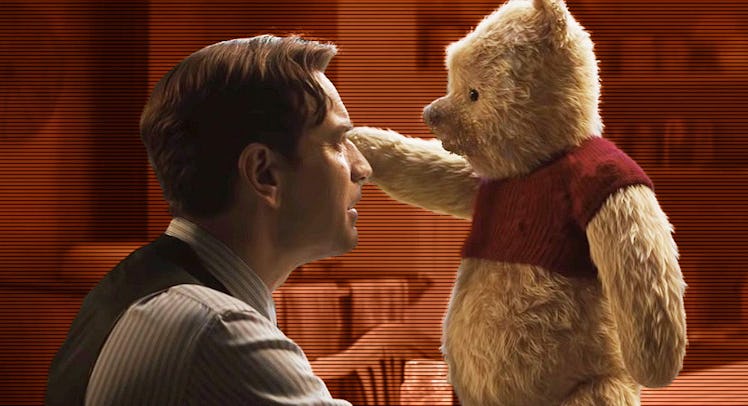Disney’s ‘Christopher Robin’ Tells a Winnie-the-Pooh Story That Doesn’t Work
It's all about wage equality which is ironic if you know anything about Disney.

Christopher Robin, the live-action adaption of A.A. Milne‘s nonexistent House at Pooh Corner sequel which was released today, is wildly unpredictable. The movie features a WWII sequence, Disney songs, romantic images of the Hundred Acre Wood, and scaled-up slapstick sequences into something that resembles a narrative in the same way Piglet, a bipedal, sweater-wearing ball of porcine neuroses, resembles a Sunday ham. In the film, Christopher Robin, played by the profoundly underutilized Ewan McGregor, and his menagerie of animated stuffed animals, who look absolutely spectacular as animated stuffed animals, trudge through a morality play about the need to balance responsibility with joy. The proceedings are confounding enough that audience members can’t be blamed for, like Pooh, focusing their full attention on their snacks.
After the audience is caught up on events outside of the Hundred Acre Wood — here’s Robin with his boyhood friends, attending boarding school, mourning his father, picking up a woman on a bus, having a daughter, fighting in a war — the movie gets rolling as Robin, now a mid-level functionary at Winslow Luggage, is asked to trim his budget, jeopardizing his weekend plans with his patient daughter Madeline (Bronte Carmichael) and his over-it wife Evelyn (Hayley Atwell). Christopher Robin can’t go to the country because he has to work. This is both literally true, he legitimately should try to save as many of his employees’ jobs as possible, and metaphorically true. You get it. He’s lost access to wonder and he needs it back.
That is where, inevitably, Disney comes in. And if you don’t know how the next two hours are going to unfold by this point, you are, as Pooh describes himself, “a bear of little brain.”
When Pooh shows up to help courtesy of a magical tree that is never really explained (it probably doesn’t matter), sticky hijinks ensue as the audience gets to watch something rather horrible: Christopher Robin being rude to Pooh. This is particularly jarring as Pooh is beautifully voiced and animated — huggable as ever. Watching Ewan Macgregor, who seems to have forgotten that he used to hang out with talking toys (even in the movie’s reality, this is unusual), dismisses Pooh’s quasi-Zen koans and Pooh himself, who he decides to return to the forest from whence he came.
What happens when they get there? Emotional revelation of course! But, no, it doesn’t feel particularly well earned. (Though the cinematographer’s paycheck certainly was.) Christopher Robin starts feeling his old self and now faces a dilemma: How to be a joyful and emotionally open man while also, you know, making staff cuts? That’s a big question and real question and a heavy question. There’s real substance to that inquiry, but the script goes well out of its way to avoid grappling with the difficulty of retaining imagination in the face of personal and professional loss.
It’s impossible to explain why the movie’s resolution is so unsatisfying without getting into spoilers here, so please brace yourself for a bit of a giveaway. (And stop reading if you intend to see the movie because this will make seeing it less fun.) Christopher Robin saves his employees by convincing his boss’s boss and father to extend vacation perks to the working class, thus establishing more demand for luggage. The big man goes for the idea immediately because he needs to or the movie doesn’t make sense — he’s not a thoroughly explore character, but seems like a chill boss. There’s a nice moment as Ewan McGregor cracks his winning smile over his antagonist’s head.
This feels good. Ignore for a moment that the impetus for the new Winslow employee perks is pure profit and you get a nice little call for workers’ rights. That’s great and the fact that the movie draws a line between corporate demand and distant parenting is admirable as well. But it’s also a confusing moral to have delivered by Disney, which has been engaged in a bitter wage dispute with the union employees of its theme park division, many of whom claim to be food and housing insecure.
Corporate hypocrisy is nothing new and it certainly won’t ruin the film for children, but it’s a bit hard to stomach in the context of a Pooh production. If there is a problem with the whole A.A. Milne extended universe, it is this: The whole thing is so pure that can’t survive the intrusion of the adult world. The Hundred Acre Wood is too fragile an ecosystem to handle an invasive species. And that is what Christopher Robin is. He’s an adult. It just doesn’t work.
Still, Pooh does. Pooh works as a character because he never works at all. He might have very little brain, but it’s hard not to conclude that his vacation plan is vastly better than his prodigal friend’s.
This article was originally published on